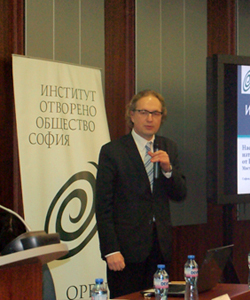Due to its isolation in terms of foreign policy over most of 2014 Bulgaria was mainly placed within the passive supporters’ category, regarding common European politics. The freezing of the South Stream project and the difficulty for this country to maintain that decision, unlike other member-states have turned Bulgaria into a leader at the diversifying gas dependence away from Russia category. These are the results from the 5th annual report of the Foreign Affairs Council, named European Foreign Policy Scorecard 2015. The scorecard is a sort of rankings under a systematic annual assessment of the EU’s work with the rest of the world. The assessments of the separate countries within the European foreign policy are in the categories “leader”, “supporter” and “slacker”, depending on whether they develop or hamper the union’s readiness to defend its interests on certain goals. Director of the European Policies programme of the Open Society Institute and author of the analysis Marin Lessenski commented the subject exclusively for Radio Bulgaria:
 “The most important thing is that Bulgaria is already taking its due place as a member-state and starts voicing its position on European issues. Thus it is now one of the factors within the decision-making process of the EU. 2014 was a really tough year, as far as home policy was concerned, with 3 governments alternating. That was why the foreign policy assessment of this country was really hard. The good thing is that Bulgaria is not lagging behind; it has been qualified as a supporter of EU policies in most cases – a positive development on previous years. Now we are also a leader in one of the surveyed areas – the energy sector. However, Bulgaria is expected to be more active on subjects of special interest for it, such as the EU expansion and the Balkans. It can take here a more active stance and can be precisely what it is required to be – a leader, heading the European foreign policy in the region. Few EU member-states can do that, in terms of diplomatic authority and resources.”
“The most important thing is that Bulgaria is already taking its due place as a member-state and starts voicing its position on European issues. Thus it is now one of the factors within the decision-making process of the EU. 2014 was a really tough year, as far as home policy was concerned, with 3 governments alternating. That was why the foreign policy assessment of this country was really hard. The good thing is that Bulgaria is not lagging behind; it has been qualified as a supporter of EU policies in most cases – a positive development on previous years. Now we are also a leader in one of the surveyed areas – the energy sector. However, Bulgaria is expected to be more active on subjects of special interest for it, such as the EU expansion and the Balkans. It can take here a more active stance and can be precisely what it is required to be – a leader, heading the European foreign policy in the region. Few EU member-states can do that, in terms of diplomatic authority and resources.”
The assessment is made on what’s been really completed as policy and certain resources and not on attitude or intentions, Mr. Lessenski pointed out.
For instance, we have got used to seeing Bulgaria as “underdeveloped”, as far as the “humanitarian aid and support for other countries” criteria is concerned. However, when one looks from the outside, it is a developed country, in view of third countries and countries in a conflict situation – it is expected to provide aid and it really does, the expert says. The important thing about this assessment is whether something is good for the EU’s greater good then respectively – for the national interest.
“A survey shows that in most cases, in almost 100 percent of those the national stances of the member-states on the subjects viewed coincide. To be precise – on the conflicts in Ukraine, the Middle East, and Syria… So, from this point of view, it was a good year for the union’s foreign policy. It’s a different matter what the result is and if the goals set are achieved. Unfortunately we see that the conflicts in Ukraine and Syria are ongoing. This comes to show that it is hard to achieve the results we want. Bulgaria remembers the war in neighboring Yugoslavia back in the 1990s – it was a long one, hard to end and with lasting negative consequences. This country’s economy suffered, there were political consequences and some issues still remain unsolved. The lesson is that the reaction should be timely and be demonstrated by all member-states.”
In the words of Foreign Minister Daniel Mitov in 2014 the challenges before the EU increased and got more complicated. “Europe faces numerous hot conflicts, instead of one Cold War”. What about the start of the new 2015?
“The start of the year is more than alarming. Europe’s internal terrorist threat after the Paris assault has been escalating. However, it is linked to an external conflict – the one with the Islamic State. We also witness an escalation in Ukraine. So, 2015 is a really tough one and Europe will face many challenges in the course of the year.”
English version: Zhivko Stanchev
In mid-January this year, eight Bulgarian cultural and educational associations from Bosilegrad, Tsaribrod, Zvontsi, Vranje, Pirot and Niš sent an open letter to the President of Serbia, Aleksandar Vucic, the Ombudsman, Zoran Pasalic, the Delegation of..
Fire kills dozens in Turkish mountain resort Kartalkaya 78 people died in a hotel fire in the Turkish ski resort of Kartalkaya in north-western Turkey. Celebrities and entire families were among the dead, and dozens..
North Macedonia’s Prime Minister Hristijan Mickoski stated that the Macedonian issue is not closed, because the European Court of Human Rights has ruled that the rights of people with a Macedonian identity in Bulgaria are not being respected...

+359 2 9336 661
